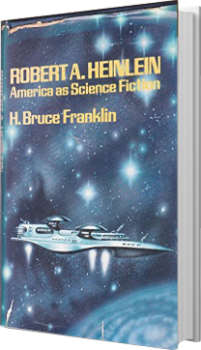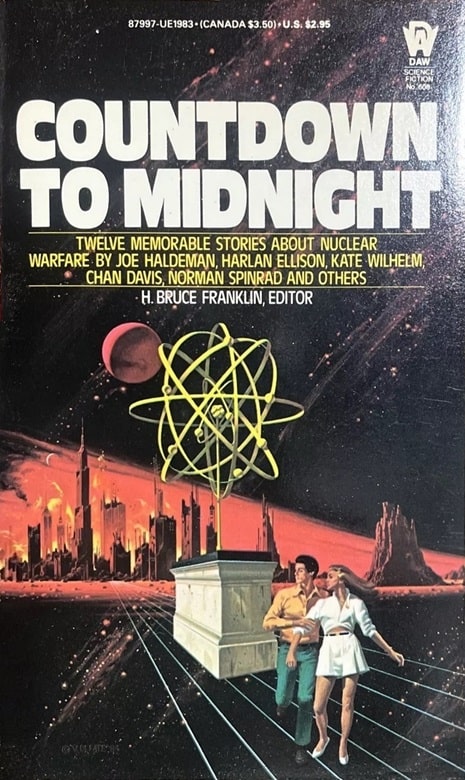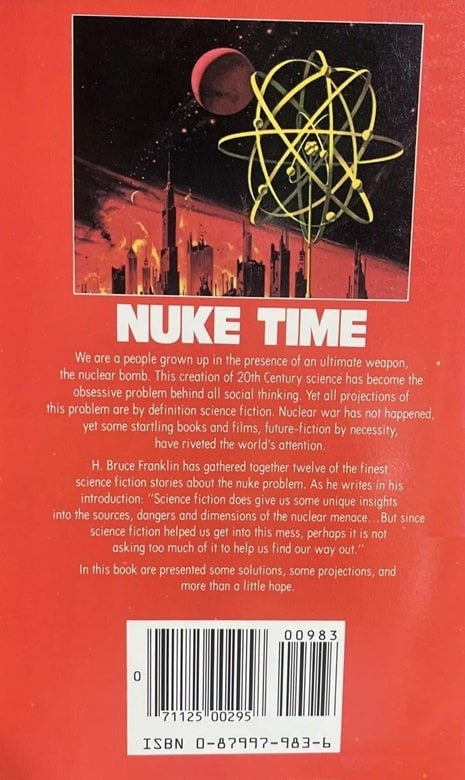H. Bruce Franklin, February 28, 1934 — May 19, 2024

I was sad to learn that H(oward) Bruce Franklin, emeritus John Cotton Dana endowed Professor of English and American Studies at Rutgers University-Newark and author of numerous books, essays, and exhibitions related to science fiction, died at the age of 90 on May 19. On a personal note, in grad school I took his seminar in science fiction studies, which reignited my interest in science fiction and prompted me to start writing about it. So, for better or worse, I probably wouldn’t be posting here were it not for Dr. Franklin.
During the 1960s, Dr. Franklin was fired from Stanford despite being tenured supposedly for inciting student anti-Vietnam war protests. A former Air Force navigator and intelligence office in the Strategic Air Command, he also resigned his commission in protest of that war.
While his range of published work ranged from Melville studies to prison literature to fish ecology, he frequently used science fiction as a lens to comment upon American history, particularly as it relates to Vietnam and the forever wars that extended to Iraq and Afghanistan. He was awarded a number of honors, including the Science Fiction Research Association (SFRA) Pilgrim Award and Pioneer Award, as well as an Eaton Award. He was a Distinguished Scholar for the International Association for Fantastic in the Arts, and was a Guest Curator for the Star Trek and the Sixties exhibit at the Smithsonian and Hayden Planetarium. From its inception up until 2002, Dr. Franklin was a consulting editor of Science Fiction Studies.
In his introduction to Future Perfect, a collection of 19th century science fiction (who knew Melville and Hawthorne wrote science fiction?), Dr. Franklin writes,
Science fiction is a form of literature that developed as as part of industrial society, and it is intimately connected with the rise of modern science and technology. In fact, one good working definition of science fiction may be the literature which, growing with science and technology, evaluates it and relates it meaningfully to the rest of human existence.
Also of particular interest to Black Gate readers is Robert A. Heinlein: America as Science Fiction.
The phenomenon of Robert A. Heinlein expresses, among other things, the extraordinary quality of the everyday experience of our century… science fiction has moved inexorably toward the center of American culture, shaping our imagination (more than many of us would like to admit) through movies novels, television, comic books, simulation games. language, economic plans and investment program, scientific research, and pseudo-scientific cults, spaceships real and imaginary.
This was written in 1968, and as true as that statement was back then, it is even more so today with the onslaught of marvel movies, Star Trek spinoffs, and dystopian novels and movies prompted by COVID and climate change.

War Stars: The Superweapon and the American Imagination traces the history of weapons in both fantasy and military history dating back to steam warships and Gatling guns up to our current nuclear arsenals. Justification of these super weapons was often to make warfare so horrible it would become unthinkable. We know how well that worked out.
Here’s a lecture Dr. Franklin did on the subject.
Tangentially, Dr. Franklin was the editor of Countdown to Midnight, a collection of stories about nuclear warfare and postnuclear societies.
 |
 |
Countdown to Midnight (DAW, December 1984). Cover by Vincent Di Fate
Given reports that Russia is starting tactical nuclear drills, maybe we should all grab a copy while we still can.

I am saddened to learn of Dr. Franklin’s death. His Heinlein study was a significant introduction to literary/cultural studies of science fiction for me when I found it in my local public library. War Stars was an excellent critique of the idolatry of weaponry that runs even through left-wing sf (cf. Isaac Asimov, “The Weapon Too Dreadful to Use”).
And I also enjoyed his marine environmental study on menhaden (aka bunker) fish, The Most Important Fish in the Sea. A true polymath and a progressive who walked the walk. Rest in Power.
[…] H. BRUCE FRANKLIN (1934-2024). Black Gate reports that scholar H. Bruce Franklin died May 19 at the age of 90. He was the emeritus John Cotton Dana endowed Professor of English and American […]